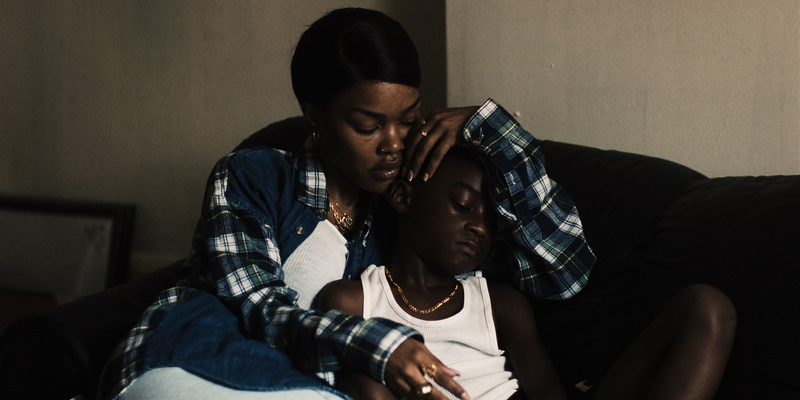
Review by
Eric Hillis
Directed by: A.V. Rockwell
Starring: Teyana Taylor, Will Catlett, Josiah Cross, Aven Courtney, Aaron Kingsley
Adetola

Horror filmmakers often set their movies in the late 20th century so as
to avoid the issues faced by our current access to communications
technology. It's a lot more difficult for a masked slasher to operate
when all their potential victims carry pocket devices that allow them to
call for help in an instant. Writer/director A.V. Rockwell opens
her feature debut A Thousand and One in 1995, a time when
her movie's nominal villains face a similar disadvantage. The "villain"
is what you might call "The System," and when we meet our
heroine/anti-heroine, the 22-year-old Inez (Teyona Taylor), she's
just been spat out of the system, in this case New York's Riker's
prison.

Tracking down her six-year-old son Terry (Aaron Kingsley Adetola), Ines abducts the boy from foster care in Brooklyn and heads for the
Harlem streets where she grew up. There she rents a room from a
sympathetic elderly landlady who sees something of her own troubled
daughter and grandson in Ines and Terry. Forged papers are acquired and
the system soon forgets about Terry's disappearance.
The mid-90s was probably the last time you could pull off such a stunt,
but while Ines gets away with it initially, the film's narrative plays
out over the course of the following 10 years, when the system becomes
increasingly advanced. The chances of Ines's deception being uncovered
grow steadily, particularly when a teenage Terry (played at 13 by
Aven Courtney and Josiah Cross) displays academic talents
that attract the attention of authority figures.

A Thousand and One departs from any potential suspense
for much of its running time as it evolves into a family drama, or at
least a found family drama. Determined to provide Terry with a father
figure, she marries Lucky (Will Catlett), who has been in and out
of her life as many times as he's been in and out of jail. While he's
happy to be a husband, Lucky isn't too keen on being a father, but in
his own sullen way he begins to bond with Terry.
Rockwell introduces us to this world in thrilling fashion, her roaming
camera capturing the excitement of a mid-90s New York that still
possessed the city's famous mix of energy and edginess, propelled by a
gorgeous, Quincy Jones-esque score by Gary Gunn. Recreating an
era as recent as the 1990s can be difficult, as there have been few
cultural shifts in the subsequent decades, but Rockwell and her crew
nail it. If you walked in on A Thousand and One you'd be
forgiven for mistaking it as a movie from the era of its setting. Of
course, the arrival of Mayor Giuliani transformed New York into a
Disneyfied tourist trap, something the film acknowledges through
montages of shifting facades and gentrification. The latter catches up
with Ines in the form of a landlord who puts on an affable front only to
screw her over in his determination to rid his building of its working
class, non-white tenants (kudos to Rockwell for portraying a white racist as middle
class and well spoken, rather than the usual stereotypical slack-jawed
yokel).

A Thousand and One offers a late plot twist that reveals
the true theme of the movie, that being the question of what constitutes
a family and how society still elevates the traditional family unit of
mother, father and kids. The revelation arrives so late that it almost
feels unexamined, and the movie may have benefitted from showing its
hand 30 minutes sooner. The film's middle portion grows a little flat as
it repeats stock working class drama scenes of parents warning their
children not to make the same mistakes they did. Where the early scenes
benefitted from a six-year-old Terry who largely reacts to the drama
around him rather than becoming involved, the later scenes are less
cinematic and more of the talky televisual variety.
But what keeps us onboard throughout A Thousand and One's narrative is the evolution of Ines, portrayed in subtly brilliant
fashion by Taylor. When we meet her first she's a firebrand, arguing
with everyone she meets, even those who are trying to help her. As the
film evolves she becomes sullen and withdrawn, broken by a system she
once outran but which is slowly, inevitably catching up with her. The
young Ines's anger subsides and gives way to resignation, and maybe a
little understanding. Perhaps the most memorable line in Rockwell's
script comes when a woman who gave birth to Lucky's child arrives at a
street party. We're unsure how Ines might react, but she gives Terry a
telling instruction - "Make her a plate" - before disappearing, unable
to face the woman. Ultimately, A Thousand and One suggests
that if we can't confront our demons and break bread with our foes, we
can at least make them a plate.

